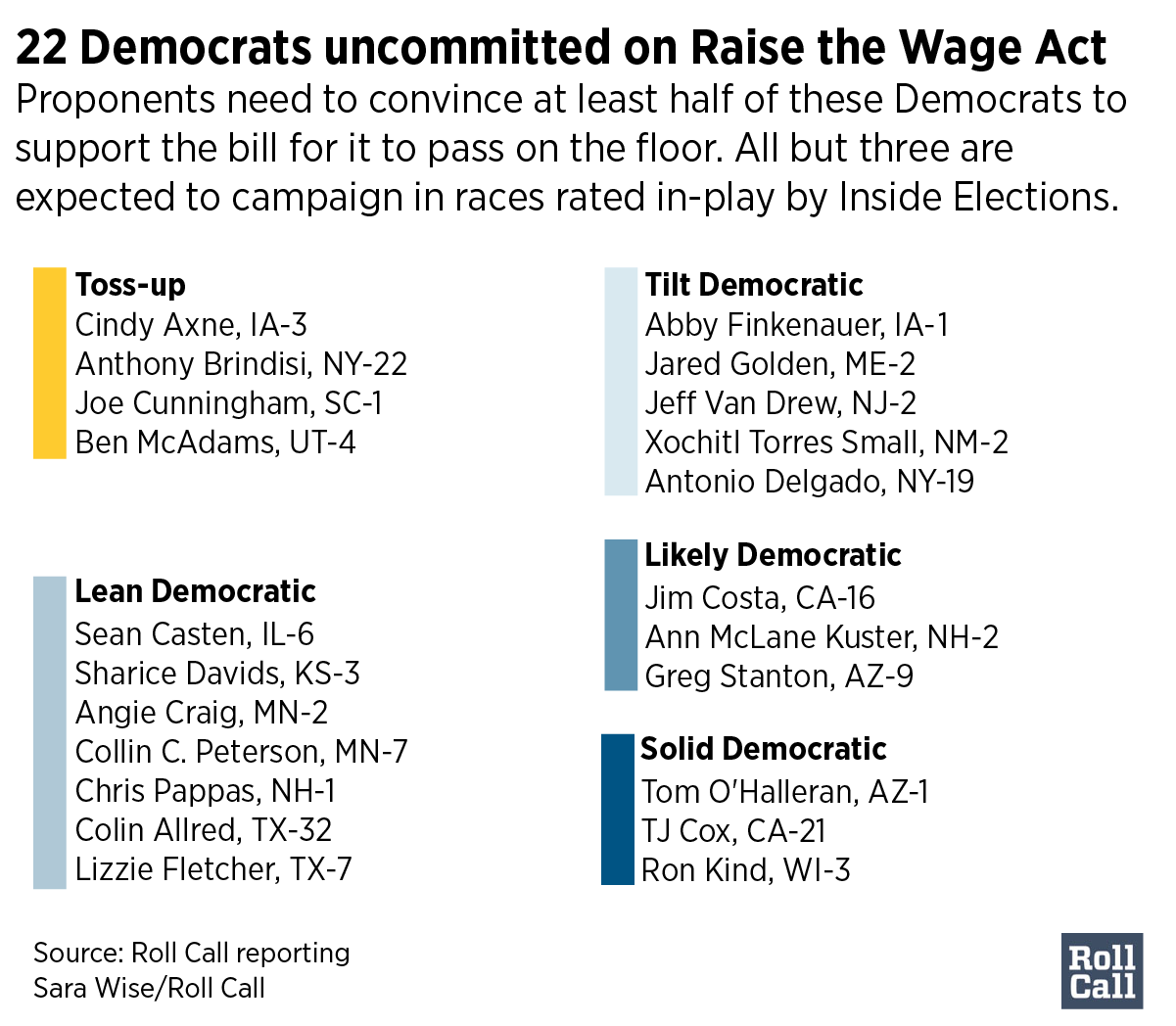Democrats close but still short votes needed to pass $15 minimum wage
Proponents of bill to double existing minimum wage over five years confident they’ll get there
House Education and Labor Chairman Robert C. Scott, D-Va., is confident he can convince enough uncommitted Democrats to support his bill to incrementally increase the federal minimum wage to $15 over five years for it to pass the chamber. (Bill Clark/CQ Roll Call file photo)
Proponents of a $15 minimum wage are bullish about the prospects of the House passing a bill to incrementally double the current $7.25 federal standard over five years, despite Democrats seemingly being short the votes to do so.
“We’re working to make sure that we have consensus, but we’re going to pass that bill with enough Democratic votes to make sure that it passes out of the House,” House Majority Leader Steny H. Hoyer told reporters during House Democrats’ retreat in Leesburg, Virginia, earlier this month.
The Raise the Wage Act is a top priority for most House Democrats, with 205 members (203 who can vote on the floor) co-sponsoring Education and Labor Chairman Robert C. Scott’s bill to gradually institute a $15 federal minimum wage and phase out the tipped wage.
Rep. Terri A. Sewell, the only House Democrat from Alabama, has offered a different approach — a regional minimum wage that would set different schedules for raising the federal standard based on costs of living in different areas. But her bill has not emerged as a true alternative, since half of the 12 members co-sponsoring it have also signed on to Scott’s bill.
Scott and the House Democratic leadership would like to bring his bill to the floor, ideally without changes. To do so they’ll be targeting 22 voting members — 24 have not signed on to either measure, but two of them voted for Scott’s bill in committee. Rep. Josh Harder of California is prepared to support the Raise the Wage Act if it is brought to the floor, his office confirmed.
Rep. Lauren Underwood of Illinois supports raising the minimum wage, but is still listening to her constituents on this particular bill, according to her office.
 Only 11 of the 22 uncommitted Democrats would need to back the bill on the floor for it to pass. That assumes all 204 sponsors, including Scott, are present to vote “yes” and that Sewell, the other six Democrats sponsoring her bill but not Scott’s, and all Republicans vote “no.”
Only 11 of the 22 uncommitted Democrats would need to back the bill on the floor for it to pass. That assumes all 204 sponsors, including Scott, are present to vote “yes” and that Sewell, the other six Democrats sponsoring her bill but not Scott’s, and all Republicans vote “no.”
“I’m optimistic because there are a number of people who’ve indicated quietly that they’ll vote for it but they don’t want to be a co-sponsor,” Scott said in an interview during the Democratic retreat.
Roll Call contacted the offices of the 22 uncommitted members, and less than half responded — most said their bosses support raising the minimum wage but signaled they remain undecided on the best proposal for doing that.
Arizona Rep. Tom O’Halleran supports raising the federal minimum wage and he is reviewing both bills, his spokesman said, noting that the congressman supported Arizona’s effort to incrementally raise the state minimum wage to $12 an hour by 2020.
Two of the members who’ve not sponsored either bill are from Texas, where the state minimum wage is the same as the $7.25 federal rate and municipalities are barred from passing their own increases.
Rep. Colin Allred supports raising the federal minimum wage and is getting input from North Texans on how to achieve that goal while reviewing the different proposals being offered, according to a spokesman.
Likewise, Rep. Lizzie Fletcher is still speaking to members of her community about the issue, her spokeswoman said.
Nine Texans are co-sponsoring Scott’s bill while two, Reps. Vicente Gonzalezand Henry Cuellar, are co-sponsoring Sewell’s measure.
Neither of New Hampshire’s two Democratic representatives, Ann McLane Kuster and Chris Pappas, have signed on to either bill. The state, which repealed its minimum wage in 2011, follows the $7.25 federal rate.
Kuster intends to vote to raise the minimum wage, her spokesman said. Pappas’ spokesman was checking with the congressman about his position but hadn’t provided a response at press time.
Illinois Rep. Sean Casten said in a statement that he’s still evaluating both bills.
“As I think through proposals, I am focused on how we grow our economy and enact pro-labor policies to benefit society. I look forward to working [with] my colleagues to advance these goals,” he said.
South Carolina Rep. Joe Cunningham is currently undecided, his spokeswoman said. The only other Democratic representative in that state, which also follows the federal rate, is Majority Whip James E. Clyburn, who is supporting Scott’s bill.
Democrats are also divided in Minnesota, where the minimum wage is $9.86 per hour for large employers and $8.04 per hour for small employers. Reps. Betty McCollum and Ilhan Omar support Scott’s bill, while Rep. Dean Phillips supports Sewell’s proposal.
Minnesota Reps. Angie Craig and Collin C. Peterson have not sponsored either measure. Craig supports increasing the minimum wage and is looking at all the proposals to do so while she talks with constituents about the best approach for her district, her office said. Peterson’s office did not respond to a request for comment.
In Iowa, another state that follows the minimum wage, two of the three Democratic members, Reps. Cindy Axne and Abby Finkenauer, have not sponsored either measure. Neither of their offices responded to requests for comment. Rep. Dave Loebsack, who is retiring after this term, supports Scott’s bill.
George Levines contributed to this report.
Next Article Previous Article

